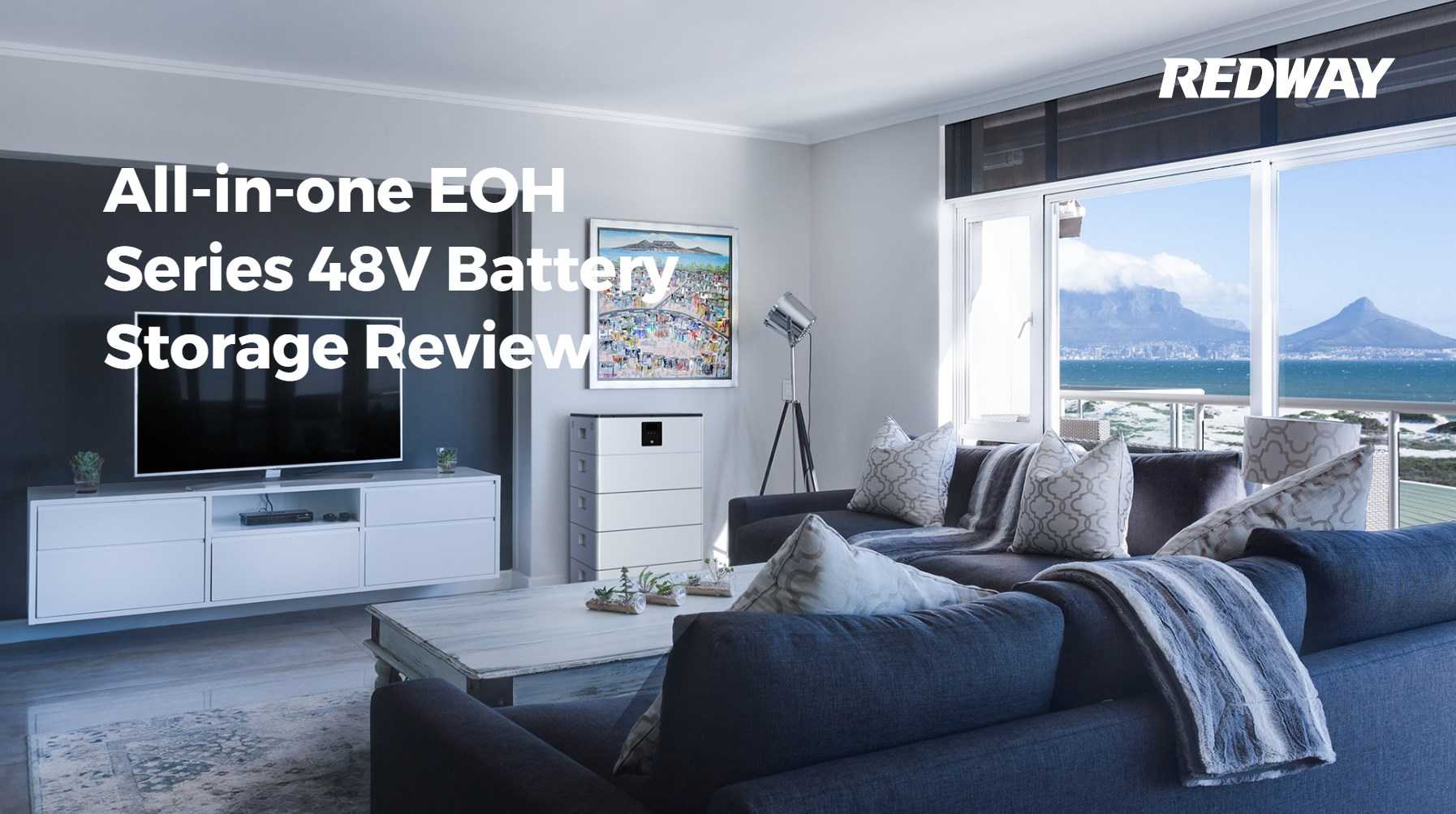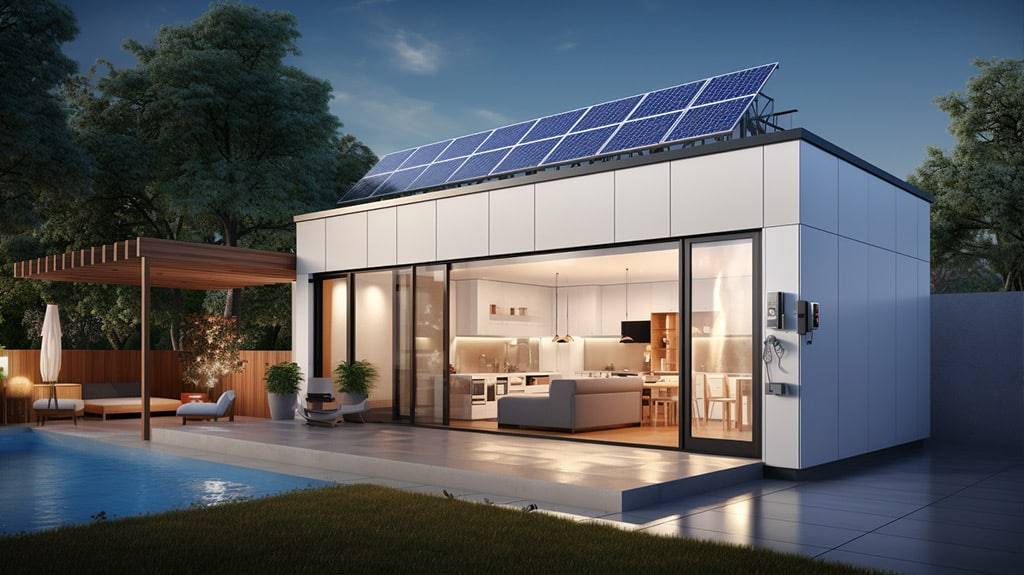The Redway EOH Series 48V Energy Storage System stands out as a premier solution for energy storage, merging cutting-edge technology with robust performance. This system is designed to meet the growing demands for reliable and efficient energy storage in various applications, including residential, commercial, and industrial settings. By integrating solar, grid, and hybrid applications, it offers unparalleled flexibility and reliability, making it a top choice for energy independence and backup power.
Key Features of the EOH Series 48V Energy Storage System
Advanced Power Output and Inverter Specifications
The EOH Series boasts a substantial 5,000W rated AC output power, providing a choice between 230Vac or 120Vac output voltage to suit different regional requirements. The inverter’s maximum PV open circuit voltage is set at 500Vdc, with an MPPT voltage range of 120~450Vdc, ensuring optimal performance and efficiency in capturing solar energy.
High-Capacity Lithium-Ion Battery
Central to the EOH Series is a 5.12kWh lithium-ion battery, operating at a rated voltage of 51.2V with a capacity of 100Ah. The battery supports a 100A (1C) constant current charge and discharge, with a discharge depth of 80%, ensuring a balance between performance and longevity. This high-capacity battery is designed to meet the rigorous demands of modern energy storage needs.
Compact and Flexible Design
The EOH Series features a compact design that facilitates easy installation and integration into various settings. The system’s dimensions (710450192mm) and the relatively lightweight components (the inverter weighing 35 kg and the battery weighing 53 kg) make it suitable for spaces with limited availability. Its modular design includes both a battery expansion module and a power module, allowing users to scale the system’s capacity as needed.

Intelligent Battery Management System (BMS)
Each battery module in the EOH Series is equipped with an intelligent BMS that monitors and controls battery status and performance in real time. This system ensures optimal performance, safety, and longevity of the batteries by providing detailed insights and automated control over charging and discharging processes.
Versatile Charging Options
The EOH Series supports multiple charging options, including photovoltaic (solar) charging and mains electricity. The photovoltaic charging module incorporates a maximum power point tracking (MPPT) algorithm to maximize solar energy utilization, while the mains charging module uses advanced control algorithms to ensure safe and reliable charging from the grid.
Pure Sine Wave Output
The inverter modules in the EOH Series utilize advanced pulse width modulation (PWM) technology to convert DC power to AC power, delivering a pure sine wave output. This ensures a stable and reliable power supply suitable for sensitive household appliances and critical equipment.
Comprehensive Protection Features
Safety and reliability are paramount in the EOH Series, which includes multiple protection features such as over-voltage protection, under-voltage protection, short-circuit protection, over-temperature protection, and overload protection. These features safeguard the system against potential hazards and ensure continuous, reliable operation.
Applications of the EOH Series 48V Energy Storage System
Off-Grid Solar Systems
The EOH Series is ideal for off-grid solar systems, providing an efficient solution for storing excess solar energy generated during the day for use at night or during periods of low sunlight. This capability enhances energy independence and ensures a consistent power supply.

Grid-Connected Solar Systems
In grid-connected solar systems, the EOH Series offers backup power during grid outages, ensuring uninterrupted power supply to homes and businesses. This feature is particularly valuable in regions prone to power disruptions, enhancing the resilience of the energy infrastructure.
Backup Power for Homes and Businesses
The EOH Series serves as a reliable backup power source for both residential and commercial applications. In the event of a power outage, the system automatically switches to battery power, providing seamless continuity of essential services and operations.
Uninterruptible Power Supply (UPS) for Critical Equipment
For critical equipment requiring an uninterruptible power supply (UPS), the EOH Series delivers stable and reliable power, preventing data loss and equipment damage caused by sudden power interruptions. This application is crucial in industries such as healthcare, IT, and manufacturing.
Energy Management and Optimization
The EOH Series also plays a significant role in energy management, allowing users to optimize their energy consumption by efficiently utilizing stored energy. This capability helps in reducing energy costs and minimizing dependence on the grid, contributing to overall energy sustainability.
Comparison Between 48V and 24V Systems
When deciding between a 48V and a 24V energy storage system, several factors need to be considered:
Energy Capacity
A 48V system offers higher energy capacity, making it suitable for applications with higher energy demands such as electric vehicles and data centers. In contrast, 24V systems are commonly used in residential solar setups due to their adequate capacity for typical household needs.
Wiring Size and Efficiency
Higher voltage systems like the 48V reduce amperage requirements, allowing for smaller wiring and reduced costs. They also enhance efficiency by reducing transmission losses, thus improving overall power generation efficiency compared to 24V systems.
Component Availability and Configuration
While both 48V and 24V systems are widely available, 48V systems have become more prevalent due to their higher efficiency and suitability for modern energy storage needs. A 48V system requires fewer batteries in series to achieve the desired voltage, simplifying the system configuration and reducing weight.
Inverter Compatibility
Inverter compatibility is crucial, as the battery pack voltage must match the inverter voltage. A 48V system requires a 48V inverter, whereas a 24V system requires a 24V inverter. Ensuring compatibility is essential for the efficient and safe operation of the system.
Conclusion
The Redway EOH Series 48V Energy Storage System stands as a high-performance, reliable, and flexible solution for modern energy storage needs. Its advanced features, including a high-capacity lithium-ion battery, intelligent BMS, versatile charging options, and comprehensive protection mechanisms, make it an ideal choice for a wide range of applications. Whether for off-grid solar systems, grid-connected setups, backup power, or critical UPS applications, the EOH Series delivers consistent and efficient energy storage. For those looking to optimize their energy management and ensure energy independence, the EOH Series is a commendable choice.




